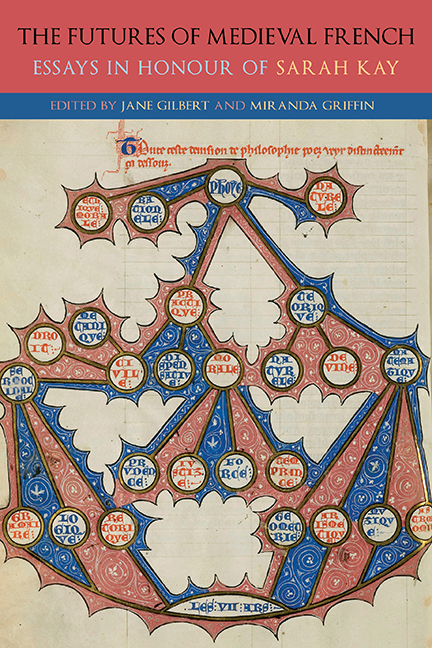Book contents
- Frontmatter
- Dedication
- Contents
- List of Illustrations
- List of Contributors
- List of Abbreviations
- Introduction
- Part I Subjectivity in Troubadour Poetry
- Part II The ‘Chansons de geste’ in the Age of Romance: Political Fictions
- Part III Courtly Contradictions: The Emergence of the Literary Object in the Twelfth Century
- Part IV The Place of Thought: The Complexity of One in French Didactic Literature
- Part V Parrots and Nightingales: Troubadour Quotations and the Development of European Poetry
- Part VI Animal Skins and the Reading Self in Medieval Latin and French Bestiaries
- Afterword
- General Bibliography
- List of Manuscripts
- Bibliography of Work by Sarah Kay
- Index
- Gallica
‘Je Tiens ma Personne Morte’: Subjectivity in Fifteenth-Century Courtly Poetry
Published online by Cambridge University Press: 27 May 2021
- Frontmatter
- Dedication
- Contents
- List of Illustrations
- List of Contributors
- List of Abbreviations
- Introduction
- Part I Subjectivity in Troubadour Poetry
- Part II The ‘Chansons de geste’ in the Age of Romance: Political Fictions
- Part III Courtly Contradictions: The Emergence of the Literary Object in the Twelfth Century
- Part IV The Place of Thought: The Complexity of One in French Didactic Literature
- Part V Parrots and Nightingales: Troubadour Quotations and the Development of European Poetry
- Part VI Animal Skins and the Reading Self in Medieval Latin and French Bestiaries
- Afterword
- General Bibliography
- List of Manuscripts
- Bibliography of Work by Sarah Kay
- Index
- Gallica
Summary
MY FIRST ENCOUNTER with Sarah Kay's work was with Subjectivity when, as a second-year undergraduate, I was being guided by Jane Taylor through fifteenth-century courtly poetry. Its most substantial impact has been on my thinking ever since about the first-person subject of late medieval narrative verse. My long-standing preoccupation with narratorial subjectivity has most recently manifested itself in a topical interest in fictional stagings of the voices of the dying and the deceased, especially, by way of a particular object of focus, in an oft-cited but under-studied compilation, Le Jardin de plaisance et fleur de rethoricque (c.1500). Extant in eight early sixteenth-century editions, this popular anthology of lyric and narrative poetry adumbrates a rudimentary story arc of a lover's wander through a garden that leads him through the experience and expression of love, loss, bereavement, and his own ultimate demise; martyr-for-love (amant martir) subjects thus abound.
Here I shall bring Subjectivity to bear on two questions arising for the future of medieval French scholarship: methodologically, what is the most fruitful way to think about subjectivity in narrative poetry, and especially narratorial subjectivity? And, topically, how do we grasp the organisational principles of anthologies like the Jardin de plaisance? As poststructuralist critics of the poetic ‘I’, we should never cease interrogating our approach to narrative selfhood, lest we slip into complacency (for instance, should we consider that a simple distinction between poet and persona suffices – Kay holds it to be ‘deeply unsatisfactory’ [Subjectivity: 138]) or dereliction of critical responsibility (through an unreflective surrender to indeterminacy of identity). The so-called material turn has pushed such interrogation in fruitful new directions, privileging space as well as time in terms of how subjectivity is constructed within the manuscript page, both textually and paratextually (through rubrication, illustration, layout, etc.; see Stephen G. Nichols in this volume, pp. 185–7). At an interesting and still under-explored juncture lie late medieval anthologies with their multiple, composite subjectivities in lyric and narrative verse. Of especial note are those, like the Jardin, which republish in print earlier manuscript texts, and thereby can be seen to work, through their selection of material, to circumscribe a past for late medieval French (however one defines that period and demarcates it from ‘early modern’), or at least to define a certain corpus, for the benefit of future audiences.
- Type
- Chapter
- Information
- The Futures of Medieval FrenchEssays in Honour of Sarah Kay, pp. 49 - 64Publisher: Boydell & BrewerPrint publication year: 2021

